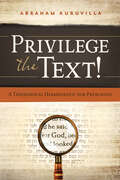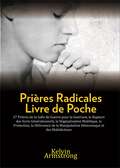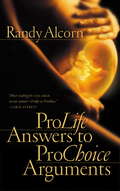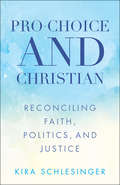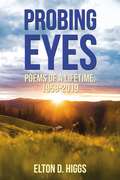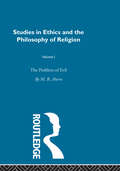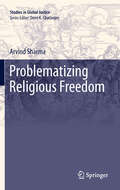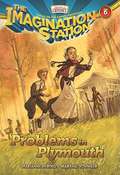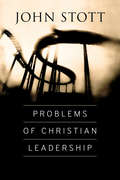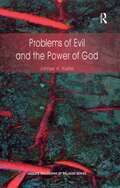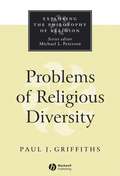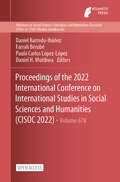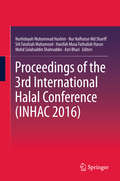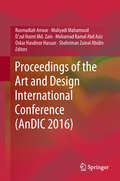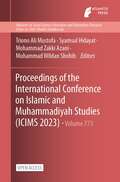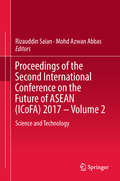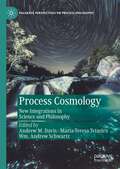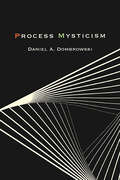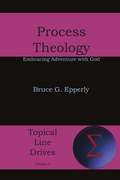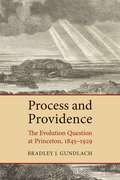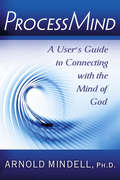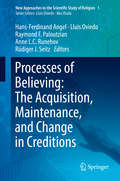- Table View
- List View
Privilege the Text!: A Theological Hermeneutic for Preaching
by Abraham KuruvillaPrivilege the Text! spans the conceptual gap between biblical text and life application by providing a rigorous theological hermeneutic for preaching. Kuruvilla describes the theological entity that is the intermediary between ancient text and modern audience, and defines its crucial function in determining valid application. Based on this hermeneutic, he submits a new mode of reading Scripture for preaching: a Christiconic interpretation of the biblical text, a hermeneutically robust way to understand the depiction of the Second Person of the Trinity in Scripture.In addition, Kuruvilla&’s work provides a substantive theology of spiritual formation through preaching: what it means to obey God, the Christian&’s responsibility to undertake &“faith-full&” obedience to divine demand, and the incentives for such obedience—all integral to understanding the sermonic movement from text to application.Privilege the Text! promises to be useful not only for preachers, and students and teachers of homiletics, but for all who are interested in the exposition of Scripture that culminates in application for the glory of God.
Prières Radicales: Livre de poche
by Kelvin ArmstrongJe suis un auteur de livres Non Fictionnels. Je suis un auteur qui écrit des livres non fictionnels en utilisant des pseudonymes. J'ai beaucoup de livres écrits en Anglais que je voudrais faire traduire dans d'autres langues.
Pro Evo
by Tomotom StiftungThe author (1911-2001) studied first agriculture and then economics. He had a successful career as a business man and business consultant. In search of the origin and meaning of existence, he discovered of it. in the 1950's a new, simple and reliable guideline for human thought and action. This guideline is oriented on cosmic evolution. Scientists have termed it the "evolutionary ethic". The author, beginning in 1971, published books about his discovery under his own name and pseudonyms. The titles included Lebensrichtig, Age of Joy, On the Side of Life, Zeitalter der Freude and Pro-Evo. The editions now available are Pro-Evo in German and this English translation
Pro-Life Answers to Pro-Choice Arguments
by Randy AlcornAs politicians, citizens, and families continue the raging national debate on whether it's proper to end human life in the womb, resources like Randy Alcorn's Prolife Answers to Prochoice Arguments have proven invaluable. With over 75,000 copies in print, this revised and updated guide offers timely information and inspiration from a "sanctity of life" perspective. Real answers to real questions about abortion appear in logical and concise form. The final chapter -- "Fifty Ways to Help Unborn Babies and Their Mothers"-- is worth the price of this book alone!From the Trade Paperback edition.
Pro-choice and Christian: Reconciling Faith, Politics, And Justice
by Kira SchlesingerDespite the claim by many Christian leaders that the pro-life/antiabortion position is the only faithful response to the debate about reproductive rights, many people of faith find themselves in a murky middle of this supposedly black-and-white issue. Christians who are pro-abortion rights are rarely pro-abortion. However, they view the decision to carry a pregnancy to term as one to be made by the woman, her medical team, her family, or personal counsel rather than by politicians. <P><P>Pro-Choice and Christian explores the biblical, theological, political, and medical aspects of the debate in order to provide a thoughtful Christian argument for a pro-choice position with regard to abortion issues. Kira Schlesinger considers relevant Scriptures, the politics of abortion in the United States, and the human realities making abortion a vital issue of justice and compassion. By examining choice from a Christian perspective, Schlesinger provides a common vocabulary for discussing faith and reproductive rights.
Proactive Parenting
by James R. LucasOne of the greatest fears of parenting is that there is simply no way of predicting how your kids will turn out. Even well-meaning friends and childhood experts say, "Just try to survive adolescence. There is not much you can do; so just hope for the best." But nowhere does the Bible say parents must settle for less. In fact, God's Word teaches numerous strategies for effective parenting. Author Jim Lucas passionately shares those strategies with you in Proactive Parenting. Why is this the only kind of parenting that works? Because it is based strictly on what God's Word says-not the unreliable wisdom of men. And every one of these strategies is supported with dynamic illustrations that will help you put these lessons to work right away in your family life.
Probing Eyes: Poems of a Lifetime, 1959-2019
by Elton HiggsProbing Eyes is a collection of 156 poems written over a period of 60 years by a Christian professor of English literature. The first and largest section is called &“Scriptural Extensions,&” and it seeks to throw fresh light on various Scriptural situations by either projecting the personality of a character though a dramatic monologue or offering a fresh slant on the events depicted. These poems proceed from asking the question, &“I wonder what this biblical character was thinking in the midst of these events.&” The second section, &“Interactions,&” presents some of the author&’s experiences in interfacing with others, from family and friends to people only casually known. The third section, &“Perspectives on Time, consists of poems written mostly as New Year&’s meditations, dealing with how we as Christians are affected by the passage of time; while the inexorable flow of time reminds of our finiteness and mortality, it also challenges us to understand how God, Who is timeless, is master of our limitations. The final section, &“Personal and Meditative,&” is a miscellanea of personal and occasional ruminations, some serious and others playful. The book has four indexes to facilitate finding a poem by title, chronological placement, Scriptural reference, or topic. The author hopes that these poems will thus lend themselves to use for private Bible study and sermon or worship application. The most fruitful reading of the poems, especially of those for which a Scriptural reference is given, will come from a careful look at the relevant biblical texts.This book is not presented as the work of a main-stream poet, for Prof. Higgs has pursued his poetry writing as an avocation, not a profession. He has opted for clarity over artistic sophistication, which may not commend him to contemporary critics and practitioners of poetic composition. At the same time, the author aspires to go beyond the kind of religious versification whose primary purpose is to convey a moral lesson through rhyming lines. That is not an ignoble objective, but it does not embrace a full participation in the linguistic complexity that characterizes serious poetry. Dr. Higgs seeks in his poems to combine the beauty of art with the beauty of Truth, and thereby to stimulate fresh attention to who God is and how He works with the people of His creation.The style of Probing Eyes is mainly free verse, but with regular use of internal rhyme, assonance, and alliteration. The reader may see reflected in this style Prof. Higgs&’s admiration for the poetry of Gerard Manly Hopkins, George Herbert, John Donne, and (in conversational tone) Robert Frost. But above all, the author hopes that readers find evidence of the influence of the Holy Spirit, ad gloriam dei.XXXXXXX
Problem Of Evil: Vol 1 (Studies In Ethics And The Philosophy Of Religion)
by M. B. AhernFirst published in 2003. Routledge is an imprint of Taylor & Francis, an informa company.
Problematizing Religious Freedom
by Arvind SharmaThe concept of religious freedom is the favoured modern human rights concept, with which the modern world hopes to tackle the phenomenon of religious pluralism, as our modern existence in an electronically shrinking globe comes to be increasingly characterised by this phenomenon. To begin with, the concept of religious freedom, as embodied in Article 18 of the Universal Declaration of Human Rights, seems self-evident in nature. It is the claim of this book, however, that although emblematic on the one hand, the concept is also problematic on the other, and the implications of the concept of religious freedom are far from self-evident, despite the ready acceptance the term receives as embodying a worthwhile goal. This book therefore problematizes the concept along legal, constitutional, ethical and theological lines, and especially from the perspective of religious studies, so that religious freedom in the world could be enlarged in a way which promotes human flourishing.
Problems in Plymouth (AIO Imagination Station Books #6)
by Marianne Hering Paul McCusker Marshal YoungerThe Imagination Station Adventures continue! Patrick and Beth’s next adventure leads them to Plymouth Plantation in 1621. There they meet William Bradford, Miles Standish, and Chief Massasoit, who are trying to establish peace between the Pilgrims and the Indians. Things are anything but peaceful, however, when a musket is stolen and the Pilgrims conclude the Indians are planning war. Only Patrick and Beth know who the real thief is—the traitor Hugh—and it’s up to the cousins to find him and stop him from causing trouble. When the cousins hear a gunshot during the first Thanksgiving feast, their worst fears are realized. They rush to the Mayflower and try to set right history, even as Hugh desperately tries to change it.
Problems of Christian Leadership
by John StottChristian leaders face challenges. But God works with us and through us to accomplish his purposes. Available here for the first time in English is John Stott's practical wisdom for younger leaders. Speaking personally from his own experience, Stott addresses issues of discouragement, self-discipline, relationships and youth. Also includes reflections on John Stott's ministry from two of his former study assistants, Mark Labberton and Corey Widmer, plus excerpts of Stott's writing about ministry, leadership and service.
Problems of Evil and the Power of God (Routledge Philosophy of Religion Series)
by James A. KellerWhy do bad things happen, even to good people? If there is a God, why aren't God's existence and God's will for humans more apparent? And if God really does miracles for some people, why not for others? This book examines these three problems of evil - suffering, divine hiddenness, and unfairness if miracles happen as believers claim - to explore how different ideas of God's power relate to the problem of evil. Keller argues that as long as God is believed to be all-powerful, there are no adequate answers to these problems, nor is it enough for theists simply to claim that human ignorance makes these problems insoluble. Arguing that there are no good grounds for the belief that God is all-powerful, Keller instead defends the understanding of God and God's power found in process theism and shows how it makes possible an adequate solution to the problems of evil while providing a concept of God that is religiously adequate.
Problems of Religious Diversity (Exploring the Philosophy of Religion #Vol. 1)
by Paul J. GriffithsExploring Religious Diversity analyzes the philosophical questions raised by the fact that many religions in the world often appear to contradict each other in doctrine and practice. Analyzes the philosophical questions raised by the fact that many religions in the world often appear to contradict each other in doctrine and practice. Evaluates the fundamental philosophical underpinnings of the debates between religious and non-religious approaches to religious diversity. Contains a glossary that defines the book's key technical terms and how they are related to one another.
Proceedings of the 2022 International Conference on International Studies in Social Sciences and Humanities (Advances in Social Science, Education and Humanities Research #678)
by Daniel H. Mutibwa Paulo Carlos López-López Daniel Barredo-Ibáñez Farrah BérubéThis is an open access book. CISOC’2022 – The 2022 International Conference on International Studies in Social Sciences and Humanities, invites the entire scientific, academic and professional community to present their contributions, which can be written in French, English, Spanish or Portuguese. All papers (full articles) will be submitted to a “double-blind review” by at least two members of the Scientific Committee, based on relevance, originality, importance and clarity. The papers presented must bring discussions on actual theoretical, or methodological, or empirical workshop proposals around Social Sciences and Humanities. The topics proposed for the Conference are related to: Psychology, Education, History, Linguistics and language, Political science, Religious studies, Philosophy, Globalization, Humanities, Archaeology, Anthropology, Inter-cultural studies, Development, Geography, Library and Information Sciences.
Proceedings of the 3rd International Halal Conference (INHAC #2016)
by Nurhidayah Muhammad Hashim Nur Nafhatun Md Shariff Siti Fatahiah Mahamood Hanifah Musa Fathullah Harun Mohd Solahuddin Shahruddin Azri BhariThis book contains selected papers which were presented at the 3rd International Halal Conference (INHAC 2016), organized by the Academy of Contemporary Islamic Studies (ACIS), Universiti Teknologi MARA (UiTM) Shah Alam, Malaysia. It addresses halal-related issues that are applicable to various industries and explores a variety of contemporary and emerging issues. Highlighting findings from both scientific and social research studies, it enhances the discussion on the halal industry (both in Malaysia and at the international level), and serves as an invitation to engage in more advanced research on the global halal industry.
Proceedings of the Art and Design International Conference (AnDIC #2016)
by Oskar Hasdinor Hassan Shahriman Zainal Abidin Rusmadiah Anwar Muliyadi Mahamood D'zul Haimi Md. Zain Mohamad Kamal Abd AzizThis book of conference proceedings contains papers presented at the Art and Design International Conference (AnDIC 2016). It examines the impact of Cyberology, also known as Internet Science, on the world of art and design. It looks at how the rapid growth of Cyberology and the creation of various applications and devices have influenced human relationships. The book discusses the impact of Cyberology on the behaviour, attitudes and perceptions of users, including the way they work and communicate. With a strong focus on how the Cyberology world influences and changes the methods and works of artists, this book features topics that are relevant to four key players - artists, intermediaries, policy makers, and the audience - in a cultural system, especially in the world of art and design. It examines the development, problems and issues of traditional cultural values, identity and new trends in contemporary art. Most importantly, the book attempts to discuss the past, present and future of art and design whilst looking at some underlying issues that need to be addressed collectively.
Proceedings of the International Conference on Islamic and Muhammadiyah Studies (Advances in Social Science, Education and Humanities Research #773)
by Triono Ali Mustofa Syamsul Hidayat Mohammad Zakki Azani Muhammad Wildan ShohibThis is an open access book. We cordially invite you to submit your papers for the International Conference on Islamic and Muhammadiyah Studies (ICIMS) 2023, This conference is part of a conference program called International Summit on Science Technology and Humanity (ISETH) 2022 Organized by Universitas Muhammadiyah Surakarta. This conference will be hosted online from Surakarta, Indonesia on 11–12 January 2023.
Proceedings of the Second International Conference on the Future of ASEAN (ICoFA) 2017 – Volume 2: Science And Technology
by Rizauddin Saian Mohd Azwan AbbasThis book examines how business, the social sciences, science and technology will impact the future of ASEAN. Following the ASEAN VISION 2020, it analyses the issues faced by ASEAN countries, which are diverse, while also positioning ASEAN as a competitive entity through partnerships. On the 30th anniversary of ASEAN, all ASEAN leaders agreed to the establishment of the ASEAN VISION 2020, which delineates the formation of a peaceful, stable and dynamically developed region while maintaining a community of caring societies in Malaysia, Indonesia, Singapore, Brunei, Vietnam, Thailand, the Philippines, Myanmar, Laos and Cambodia. In keeping with this aspiration, Universiti Teknologi MARA Perlis took the initial steps to organise conferences and activities that highlight the role of the ASEAN region. The Second International Conference on the Future of ASEAN (ICoFA) 2017 was organised by the Office of Academic Affairs, Universiti Teknologi MARA Perlis, to promote more comprehensive integration among ASEAN members. This book, divided into two volumes, offers a useful guide for all those engaged in research on business, the social sciences, science and technology. It will also benefit researchers worldwide who want to gain more knowledge about ASEAN countries
Process Cosmology: New Integrations in Science and Philosophy (Palgrave Perspectives on Process Philosophy)
by Andrew M. Davis Maria-Teresa Teixeira Wm. Andrew SchwartzThis book newly articulates the international and interdisciplinary reach of Whitehead’s organic process cosmology for a variety of topics across science and philosophy, and in dialogue with a variety historical and contemporary voices. Integrating Whitehead’s thought with the insights of Bergson, James, Pierce, Merleau-Ponty, Descola, Fuchs, Hofmann, Grof and many others, contributors from around the world reveal the relevance of process philosophy to physics, cosmology, astrobiology, ecology, metaphysics, aesthetics, psychedelics, and religion. A global collection, this book expresses multivocal possibilities for the development of process cosmology after Whitehead.
Process Mysticism: Process Mysticism
by Daniel A. DombrowskiProcess Mysticism uses the process philosophies of Charles Hartshorne, Alfred North Whitehead, and Henri Bergson to explore mystical religious experiences. The aim is not so much to demonstrate that such experiences are true or veridical as it is to understand, in a William Jamesian fashion, how they could be possible and not contradict the concept of God held by philosophers and theologians. Divine world-inclusiveness, ideal power and tragedy, the ontological argument, asceticism and the via negativa, divine visions and voices, and the aesthetics and ethics of mysticism are all treated in detail. The book is ecumenical in that it is meant to illuminate mystical experiences as they occur around the world in different religious traditions, but the author is especially familiar with those in the Abrahamic religions. "Mysticism" can refer to either direct experience of God or the claim that such experience is ineffable, and both senses of the term are carefully analyzed in the book.
Process Theology: Embracing Adventure with God, Volume 5
by Bruce G. EpperlyIn this brief, lively, and engaging book, Dr. Bruce Epperly untangles the difficult concepts of process theology and shows how we can envision a God who is in relation to us throughout our lives here and in the next world. He believes that "God is present at the moment of our conception, guides us through the adventures of this lifetime, urging us to rejoice in embodiment and bring healing to our world, and upon our final earthly breath receives us with open arms with visions of future adventures in communion with God and our fellow creatures." Not only is this theology easy to understand, it challenges us to live out God's adventure in with joy, sharing God's life with all of God's creatures.
Process and Providence: The Evolution Question at Princeton, 1845-1929
by Bradley J. GundlachCharles Hodge, James McCosh, B. B. Warfield -- these leading professors at Princeton College and Seminary in the nineteenth and early twentieth centuries are famous for their orthodox Protestant positions on the doctrine of evolution. In this book Bradley Gundlach explores the surprisingly positive embrace of developmental views by the whole community of thinkers at old Princeton, showing how they embraced the development not only of the cosmos and life-forms but also of Scripture and the history of doctrine, even as they defended their historic Christian creed.Decrying an intellectual world gone “evolution-mad,” the old Princetonians nevertheless welcomed evolution “properly limited and explained.” Rejecting historicism and Darwinism, they affirmed developmentalism and certain non-Darwinian evolutionary theories, finding process over time through the agency of second causes — God’s providential rule in the world -- both enlightening and polemically useful. They also took care to identify the pernicious causes and effects of antisupernatural evolutionisms. By the 1920s their nuanced distinctions, together with their advocacy of both biblical inerrancy and modern science, were overwhelmed by the brewing fundamentalist controversy.From the first American review of the pre-Darwinian Vestiges of the Natural History of Creation to the Scopes Trial and the forced reorganization of Princeton Seminary in 1929, Process and Providence reliably portrays the preeminent conservative Protestants in America as they defined, contested, and answered -- precisely and incisively -- the many facets of the evolution question.
ProcessMind
by Arnold MindellEinstein said, "I want to know the mind of God, the rest are details." This book is therapist Arnold Mindell's response. By processmind he means an earth-based experience of the universal state of consciousness that, he argues, pervades all reality. It is perhaps our most basic, least known, and greatest power, combining the nonlocality of modern physics with altered states of consciousness found in peak experiences. What makes this book unique is that it offers some experience of this mind-state to the reader. Mindell does so by connecting cosmic patterns seen in physics with experiences occurring in psychology and world spiritual traditions. He draws together ideas about Aboriginal totem spirits, quantum entanglement, and nonlocality to describe the "structure of God experiences." Enhancing his clear presentation are around 80 illustrations and 30 experiential exercises based on tested approaches that actualize our deepest, unitive consciousness. Through rational thinking and earth-based, inner experience, the reader can sense how the processmind's self-organizing intelligence helps with dreams, body symptoms, relationships, and large-group conflict issues. Altogether, the book is a kind of user's guide to tapping into an immense power that can benefit our own individual life and, ultimately, the world.
Processes of Believing: The Acquisition, Maintenance, and Change in Creditions
by Raymond F. Paloutzian Lluis Oviedo Anne L.C. Runehov Hans-Ferdinand Angel Rüdiger J. SeitzThis volume answers the question: Why do we believe what we believe? It examines current research on the concept of beliefs, and the development in our understanding of the process of believing. It takes into account empirical findings in the field of neuroscience regarding the processes that underlie beliefs, and discusses the notion that beyond the interactive exploratory analysis of sensory information from the complex outside world, humans engage in an evaluative analysis by which they attribute personal meaning and relevance to the probabilistic representations of objects and events. Beliefs exert a strong influence on behaviour, decision-making, and identifying and solving problems. Despite their importance, beliefs have until recently not been at the centre of scientific interest. In fact, "belief" is an ill-defined phenomenon. From a transdisciplinary perspective the actual approaches to understanding belief seem incompatible as they attempt to highlight such different topics as "belief - religion", "belief - spirituality", "belief - faith", "belief - knowledge", "belief - attitude", "belief - disbelief", "belief - illusion", and "believing - brain function". This situation contradicts the idea that belief is close to pathological phenomena and that it should be eliminated from scientific discussions. Rather, believing is fundamental for understanding the many problems of every-day life. In fact, the book shows that beliefs are relevant for politics, international affairs, economy, law, or religions also in modern societies. This book presents the increasing scientific interest in beliefs and believing, and reflects the change in focus from the content aspect of belief towards the fluid nature of believing.
Processmind
by Arnold MindellEinstein said, "I want to know the mind of God, the rest are details." This book is therapist Arnold Mindell's response. By processmind he means an earth-based experience of the universal state of consciousness that, he argues, pervades all reality. It is perhaps our most basic, least known, and greatest power, combining the nonlocality of modern physics with altered states of consciousness found in peak experiences. What makes this book unique is that it offers some experience of this mind-state to the reader. Mindell does so by connecting cosmic patterns seen in physics with experiences occurring in psychology and world spiritual traditions. He draws together ideas about Aboriginal totem spirits, quantum entanglement, and nonlocality to describe the "structure of God experiences." Enhancing his clear presentation are around 80 illustrations and 30 experiential exercises based on tested approaches that actualize our deepest, unitive consciousness. Through rational thinking and earth-based, inner experience, the reader can sense how the processmind's self-organizing intelligence helps with dreams, body symptoms, relationships, and large-group conflict issues. Altogether, the book is a kind of user's guide to tapping into an immense power that can benefit our own individual life and, ultimately, the world.
